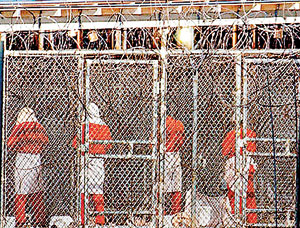Sunday Times 2
Obama’s zombie prison: Gitmo is worse than Alcatraz
View(s):By Naomi Wolf
NEW YORK – Why add to something that is not supposed to exist?
The something in question is the Unites States’ prison in Guantánamo Bay, for which the Pentagon recently requested $49 million in extra funding. Despite Barack Obama’s promise in 2009 – one of his first as President – to shut down “Gitmo,” the US evidently has no intention of doing so anytime soon. In fact, the only thing concerning Gitmo that the Obama administration has shut down is the office of the special envoy, Daniel Fried, who had been tasked with its closure. The US State Department reassigned Fried in late January, and he will not be replaced.

Prisoners in Guantánamo must shower in individual shower stalls that are placed in main hallways and fronted by glass, leaving them naked in full view of female guards
How better to memorialise that decision than with a building boom at the prison? The new facility for which the money is to be earmarked will house 106 prisoners (the precise number is uncertain) who have been neither tried nor charged.
Eight of the prisoners are now entering the second month of a hunger strike. According to the spokesman for the US Southern Command, which oversees Gitmo, the hunger strikers are disillusioned, because they believed Obama’s pledge to close Gitmo. Indeed, they are cleared to leave, and it is only Obama’s failure to keep his promise – and the US Congress’s failure to legislate their transfer – that is keeping them there. So now they feel that the only way they can get the world’s attention is to “do something drastic.”
One reason why the Pentagon needs to build a costly new facility has to do with the role of private contractors in driving detention policy. At Gitmo, corporate contractors run the show.
They share signage with military units; enjoy better housing than military personnel; run the food services; and import Southeast Asian workers to build the gigantic infrastructure, which was new when I visited in 2009 (calling into question the “deterioration” cited to justify the latest cash infusion).
Contractors also ran the military tribunal facility, and even set policy – deciding, for example, what could be told to the press. Based on some disputes that I witnessed, contractors appeared to outrank soldiers.
The vast, often undocumentable profits that flow to these companies go a long way toward explaining why facilities like Gitmo – and privately owned and operated prisons in the US itself – never close. The transfer of public money to private corporations is far more attractive than old-fashioned market capitalism.
But then there is the brutality of the prison. I recently toured Alcatraz, the former US federal prison in San Francisco Bay. Like Gitmo, Alcatraz was created, in the 1930s, to house what was then “the worst of the worst” – the Muslim terrorists (or accused terrorists) of their day. Mass murderers and gangsters – including, for example, Al Capone – were incarcerated there.
Alcatraz was closed 50 years ago, in 1963, owing to its perceived inhumanity, and the prisoners were transferred elsewhere. Yet I was struck by how much more humane the facility and regime at Alcatraz were compared to Gitmo.
For starters, prisoners at Alcatraz who broke rules or were violent were punished by being put in “D Block,” where the cells had no windows; at Gitmo, all the cells that journalists are shown lack windows or natural light. Solitary confinement in D Block was seen as the harshest punishment, and it was never used for more than 48 hours at a time. At Guantánamo – and in other US facilities – prisoners are placed in solitary confinement for days or weeks at a time, which can lead to psychosis.
Likewise, in Alcatraz, prisoners had access to a fully stocked library, monthly visits from loved ones, and mail delivery. At Gitmo, contrary to Red Cross rules, prisoners may not receive visits or mail from family, their reading is dramatically curtailed, and news is censored. They are not even notified of the deaths of parents and children.
Prisoners at Alcatraz also had basic privacy. They were stripped naked on entry, but then wore clothing and showered in single-sex groups with male guards. By contrast, prisoners in Guantánamo must shower in individual shower stalls that are placed in main hallways and fronted by glass, leaving them naked in full view of female guards.
And, of course, the prisoners in Alcatraz had been tried in a court of law, defended by lawyers whose communications with them were privileged, and duly convicted of their crimes. The men in Guantánamo have never been tried; their lawyers’ communications are monitored; and their lawyers may not even report to journalists or tribunals what was done to their clients to extract confessions, because – in a twist worthy of Franz Kafka – investigators’ methods, which detainees claim include torture, are classified. The eight hunger strikers are being fed through tubes inserted into their stomachs. This is a brutal process – the men are strapped onto restraint chairs twice a day and force-fed, in a facility that I witnessed. During my visit in 2009, a Yemeni hunger striker, Mohammad Saleh, died. As with all hunger strikers who have died at Gitmo, the US military ruled his death a suicide.
Perhaps, someday, tourists will travel to Guantánamo and look in horror and amazement at what America built. Until then, Americans need to ask themselves what has coarsened in the national conscience between 1963 and today. How is it that a prison too brutal for gangsters, too un-American to house the worst of the worst, was more humane than a place that Americans are spending millions to enlarge?
Naomi Wolf is a political activist and social critic whose most recent book is Vagina: A New Biography. Copyright: Project Syndicate, 2013. www.project-syndicate.org Exclusive to the Sunday Times
Follow @timesonlinelk
comments powered by Disqus

















